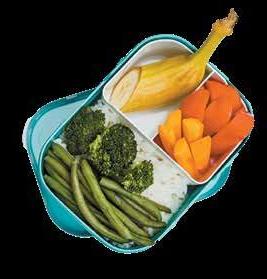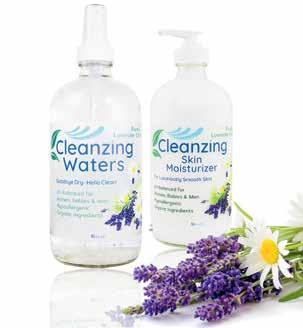
6 minute read
BACK-TO-SCHOOL WELLNESS
Tips to Keep Kids Healthy
by Ronica O’Hara
Advertisement

drobot dean/AdobeStock.com
After a year dealing with the ups and downs of pandemic-era schooling, many parents are anticipating their children’s return to school with mixed emotions. “Families indeed have had a rough time in the pandemic, resulting in increased food insecurity, weakened social skills, splintered attention spans due to constant multitasking and arguments over screen time, yet many families also feel that they grew closer together as they coped with the adversity,” says Jenifer Joy Madden, author of How To Be a Durable Human.
As we wave our children off to classes, we can draw on those hard-won, deeper ties by taking steps to ensure our children’s health and well-being. Here are some suggested strategies:
Hold a family sit-down
Meet as a group to talk about schedules and logistics to make sure everyone’s commitments will work together, recommends Erika Beckles Camez, Ph.D., a licensed family therapist in Temecula, California. “Talk as a family about how everyone feels about going back to school and intentionally tell your student that throughout the year if they are needing support or are feeling overwhelmed or concerned, they can always talk to you to work through the issue together,” she says.
Reset bedtime creep
“During the summer, bedtime tends to creep later and later. Two weeks before school starts, begin to reset bedtime by reversing the creep by 15 minutes every few nights,” suggests Amber Trueblood, a licensed marriage and family therapist in Culver City, California, and author of Stretch Marks. The American Academy of Pediatrics recommends that children 6 to 12 years of age sleep nine to 12 hours a night and teenagers 13 to 18 sleep eight to 10 hours. Getting enough sleep, it advises, leads to “improved attention, behavior, learning, memory, emotional regulation, quality of life, and mental and physical health.” Sleep experts recommend not allowing kids to be on device screens beginning an hour before bedtime, and perhaps storing devices in another room.
Buoy them with breakfast
According to the U.S. Department of Agriculture, children that eat a complete breakfast have been shown to work faster, make fewer math mistakes and show improved concentration, alertness, comprehension and memory. “Get in the habit of a healthy breakfast that contains a mix of lean proteins, healthy fats and unrefined carbohydrates and fiber,” advises Amy
Spindel, a functional holistic nutritionist in Plano, Texas. “That might be something like eggs scrambled with spinach in olive oil; a smoothie with greens, coconut milk, nut butter, cherries and steamed cauliflower; or a small bowl of steel-cut oatmeal with berries and almond butter alongside some turkey sausage. These types of combinations help promote stable blood sugar until lunchtime, which means your child will be able to focus on learning and social interactions instead of their tummies.”
Satisfy them with healthy snacks
There’s a metabolic reason students head straight for the fridge when they get home—but it’s best if they can’t grab sweets. “Children need healthy, whole-food, nutritious snacks after school to fuel both their bodies and their brain,” says Uma Naidoo, M.D., a Harvard-based nutritional psychiatrist, professional chef and author of This Is Your Brain on Food. To support optimal brain development and help lower kids’ anxiety and hyperactivity levels, she suggests snacks rich in omega-3 fatty acids, vitamins A, B12 and D, and iron and folate, such as: n “Fries” cooked in an air fryer to crisp up zucchini, carrots or green beans n Veggie dips or hummus made with chickpeas, carrots, beets or spinach n Almond butter on celery sticks, or seed butter for dipping sweet peppers or apple slices n Homemade fish sticks made by heating salmon pieces in an air fryer n Granola that includes walnuts, chia seeds and flax seeds
Take allergy precautions

About one in 14 U.S. children has a food allergy. Anisha Angella, an early childhood specialist and author of Easing Allergy Anxiety in Children, recommends taking special precautions with an allergy-prone child, including frequent handwashing; carrying an EpiPen for sudden, severe reactions that require an epinephrine injection; and not sharing foods. “Connect with their teachers,” she advises. “They want to help in any way, too. When a child sees an adult that supports their allergy safety in all environments, they feel comfortable, and that lessens anxiety.”
“Readjusting from the pandemic will take patience and perseverance on the part of parents,” says Madden. “Having the family start simple wellness habits can help.”
Health writer Ronica O’Hara can be contacted at OHaraRonica@gmail.com.
Are you reAdy to feel greAt?

Our ozone sauna safely and powerfully detoxifies the body.
“Breathing clear now, improved energy levels.”
ElizabEth, avE Maria, Fl $50 First HOCAtt OzOne sAunA
Try it today!
CAll 802-752-6342
www.SparkHealthTechnologies.com
11983 Tamiami Trail N • Suite 150 • Naples, Fl
Online Workshops On Happiness!
One FREE Online Session
Learn, Be Inspired & Transform Make Positive Changes in 2021
Lulu Carter Expert in the Science of Happiness
Online Sessions - Workshops 239.290.7008
BreaSt cancer
Words NO ONE should EVER hear!
Dramatically increase your chances of detecting Breast Cancer or abnormalities in their earliest stages - years before a tumor is present.
Early enough to use preventative measures.
Breast thermography is: FDa licensed no radiation no Breast compression low cost no Dr. referral needed
NORMAL
Good thermal symmetry with no suspicious thermal findings.
DUCTAL CARCINOMA
The upper left breast was suspicious and investigation indicated a mass.
The only non-invasive way to image Pain and Pathology anywhere on the body.
NOW OFFERING loW coSt
FULL-BODY, HALF-BODY AND BREAST IMAGING +Foot Bath Detox
SuncoaSt thermal ImagIng
308 S.E. 43rd Lane, Cape Coral FL 33904 239-540-1002
Kimberly Lemons, CCT lemons2860@aol.com
business spotlight
by Lisa Marlene
When Barbara Sabran and her husband Ira founded Cleanzing Company, LLC, in Naples, they were determined to do their part in solving one of the world’s biggest problems, the over-proliferation of plastics in our waterways and oceans and the impact on the creatures that live there and humans. According to the joint study by global consulting firm Dalberg and the University of Newcastle, in Australia, humans ingest on average five grams of plastic weekly, the equivalent of a credit card, and annually a dinner-size plate of tiny pieces of plastic. “While we also wanted to create natural cleaning products for home use, such as our laundry detergent, dish liquid, granite gloss and glass gloss multipurpose cleaner, we also wanted to focus on natural hygiene products for the face, hair and body, such as our hand sanitizer, cleanzing wash, conditioner and moisturizer, as well as being mindful about packaging.” They produce all their products locally. Made with natural, organic ingredients, pH-balanced and hypoallergenic, one of the most eco-friendly Cleanzing Company products is the fragrant, witch hazel-based Cleanzing Waters spray in a sturdy, refillable glass container. It is the perfect replacement for disposable wet wipes that often contain plastic, are not biodegradable, pose a major problem in sewers and find their way into oceans. “Dermatologist-tested and safe for women, men and infants’ bottoms when sprayed on any toilet tissue, it creates a comfortable and hygienic wipe that minimizes any environmental impact,” says Barbara, who adds that scented products are made with only organic essential oils. Fragrance-free, sensitive skin versions of the same products are also available.

Cleanzing Company is located at 4707 Enterprise Ave. Cleanzing Company products are available at Food & Thought, located at 2132 Tamiami Tr. N., and at Oakes Farms Seed to Table, located at 4835 Immokalee Rd., in Naples. For more information, visit Cleanzing.com.




